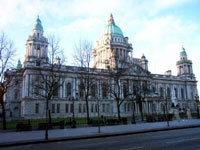Airport
Belfast International Airport
IATA Code: BFSLocation: The airport is situated 18 miles (29km) north west of Belfast.
Time: Local time is GMT (GMT +1 between the last Sunday in March and the Saturday before the last Sunday in October).
Contacts: Tel: +44 (0)28 9448 4848.
Transfer between terminals: The International Airport Taxi Company offer taxis outside the right hand door of the airport Exit lobby with a list of fares displayed in the exit hall of the terminal. The cost is approximately £25 and the journey from the Airport to Belfast takes around 25 minutes.
Transfer to the city: The Airport Express operates between the airport and the city centre every 10 minutes from outside the terminal building, 24 hours a day. The International Airport Taxi Company offer taxis outside the right hand door of the airport Exit lobby with a list of fares displayed in the exit hall of the terminal. The cost is approximately £25 and the journey takes around 25 minutes.
Taxis: International Airport Taxi Company offer taxis outside the right hand door of the airport Exit lobby with a list of fares displayed in the exit hall of the terminal. The cost is approximately £25 and the journey takes around 25 minutes.
Car rental: Car rental companies include Avis, Budget, Hertz and National and can be found in the Arrivals hall.
Facilities: Facilities at the airport include bureaux de changes, ATMs, WiFi, duty-free shopping, travel agent, business lounge, information desk and a variety of shops and restaurants. Passengers with disabilities are well catered for.
Parking: There are three parking options at Belfast International Airport. Short-stay parking starts at £1 for the first 30 minutes, £2 for 60 minutes, and £33.70 for the day. The Main Car Park starts at £3.40 for the first hour, and goes up to £13.20 per day. The Long Stay Car Park charges £9 for the first day. The pick-up and drop-off zones cost £1 for a 10-minute stay.
Departure tax: None.
Website: www.belfastairport.com
George Best Belfast City Airport
IATA Code: BHDLocation: The airport is situated a mile (3km) east of Belfast.
Time: Local time is GMT (GMT +1 between the last Sunday in March and the Saturday before the last Sunday in October).
Contacts: Tel: +44 (0)28 9093 9093.
Transfer to the city: Approved taxis are available outside the terminal building, charging about £6 fare to the city centre. The Airlink bus service departs every 30 minutes from the airport terminal to the Belfast Europa Bus Centre in the heart of the city. The service runs between 6am and 9.50pm daily at a fare of £2 for a single journey. Buses also connect the airport to main railway stations.
Car rental: Car rental companies include Avis, Budget, Hertz, Europcar and National.
Facilities: Airport facilities include ATMs, bureau de change, wireless Internet, restaurants and shops. Passengers with disabilities are well catered for.
Parking: Short term, long term and executive parking is available. A shuttle bus connects the long term parking to the terminal.
Departure tax: None.
Website: www.belfastcityairport.com
Visit worldtravels.com for the full guide to Belfast. Build a complete Belfast travel guide and email to your clients - sign up for a trial subscription of World Travels Pro.
Belfast

The fortunes of Belfast have risen and fallen over time, from its beginnings as a Bronze Age settlement to extensive World War II bombings and civil conflict. Today the capital of Northern Ireland is a thriving city that has regained some of its old charm and industry, and has begun to lure the curious traveller.
Belfast is situated near the mouth of the River Lagan and blossomed in the 17th century with an influx of English and Scottish settlers. The port city grew in prominence during the Industrial Revolution, with booming linen, rope-making and shipbuilding industries. The ill-fated Titanic was built here in the Harland and Wolff shipyards and today Belfast still boasts the world's biggest dry dock, as well as a restored Waterfront Complex that houses chic restaurants, shops and ubiquitous Irish pubs.
Much of the city's architectural heritage was destroyed during repeated bombings in World War II, as well as during the Troubles; civil conflict between Roman Catholic nationalists and Protestant unionists that raged from 1969 until the late 1990s. Several exquisite Victorian and Edwardian buildings remain, however, and have been filled with trendy bars, boutiques, galleries, museums and restaurants in an attempt to regenerate the city's image. Evidence of the Troubles can still be seen in the many murals that line Falls Road and Shankill Road, and the Europa Hotel has become famous as one of the most bombed buildings in Europe, having being targeted no less than 27 times.
Belfast is often overlooked as a tourist destination, but its fascinating history, ongoing struggles, many attractions and above all, the warmth and acerbic wit of its inhabitants make it an essential stop on any trip to Northern Ireland. It also serves as an excellent base from which to explore the many wonders of the region.







